
Legume Research
Scope & Guideline
Cultivating Knowledge for Sustainable Legume Solutions
Introduction
Aims and Scopes
- Genetic Diversity and Breeding:
Research on the genetic diversity of legume species, including molecular markers, breeding techniques, and genomic studies to enhance traits such as yield, disease resistance, and abiotic stress tolerance. - Agronomic Practices and Crop Management:
Studies focusing on various agronomic practices, including nutrient management, irrigation methods, and crop rotation strategies that improve legume yield and sustainability. - Pest and Disease Management:
Research aimed at understanding the interactions between legumes and pests/diseases, including resistance mechanisms, biological control, and integrated pest management strategies. - Nutritional Quality and Functional Properties:
Evaluation of the nutritional qualities of legumes, including protein content, amino acid profiles, and health benefits, as well as the impact of different cultivation practices on these attributes. - Environmental Impact and Sustainability:
Studies assessing the environmental impacts of legume cultivation, exploring sustainable practices and the role of legumes in improving soil health and reducing dependency on chemical fertilizers.
Trending and Emerging
- Precision Agriculture and Technology Integration:
An increasing number of studies are focusing on the application of precision agriculture technologies, such as remote sensing, AI, and machine learning, to optimize legume farming practices. - Climate Resilience and Adaptation:
Research on the effects of climate change on legume crops, including studies on drought tolerance, heat stress, and adaptive strategies, is gaining prominence as global warming impacts agriculture. - Biofortification and Nutritional Enhancement:
There is a growing trend towards exploring biofortification techniques to enhance the nutritional quality of legumes, addressing global malnutrition and food security issues. - Sustainable Practices and Organic Farming:
An increase in research focused on sustainable and organic farming practices, including the use of cover crops, organic fertilizers, and integrated pest management, reflects the global shift towards environmentally friendly agriculture. - Genomic and Molecular Approaches:
The application of genomic tools and molecular breeding techniques is trending, with a focus on understanding the genetic basis of traits critical for legume improvement.
Declining or Waning
- Traditional Breeding Methods:
There is a noticeable decrease in studies focused on traditional breeding methods, as more researchers are gravitating towards advanced genetic techniques like CRISPR and molecular breeding. - Basic Agronomic Studies:
Research that merely describes basic agronomic practices without innovative approaches or technology integration appears to be declining, as the field moves towards more complex, data-driven analyses. - Local Pest Resistance Studies:
Papers focusing solely on local pest resistance without integrating broader aspects of pest management or ecological interactions are becoming less common, indicating a shift towards a more holistic view of pest management.
Similar Journals
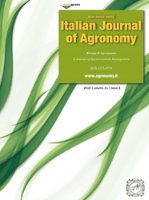
Italian Journal of Agronomy
Bridging theory and practice in agricultural innovation.The Italian Journal of Agronomy is a prestigious, peer-reviewed outlet dedicated to advancing research and scholarship in the field of agronomy and crop science. Published by PAGEPRESS PUBL in Italy, this journal is committed to providing a platform for the dissemination of high-quality research since achieving its Open Access status in 2006. With an ISSN of 1125-4718 and an E-ISSN of 2039-6805, it is recognized for its contribution to the scientific community, boasting a commendable Q2 category ranking in Agronomy and Crop Science as of 2023. The journal's impressive Scopus ranking places it in the 75th percentile within General Agricultural and Biological Sciences and the 69th percentile in Agronomy and Crop Science, reflecting its significant impact and relevance. Covering a wide range of topics relevant to agriculture, from sustainability practices to innovative farming techniques, the Italian Journal of Agronomy serves as an essential resource for researchers, professionals, and students seeking to enrich their knowledge and contribute to the advancement of the agricultural sciences.
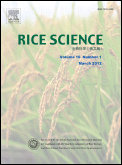
Rice Science
Advancing the Future of Rice ResearchRice Science is an esteemed open-access journal published by Elsevier that has been a pivotal source of insight for researchers in the fields of Agronomy, Biotechnology, and Plant Science. With an impressive impact factor, it stands out in the Q1 category of its respective fields, showcasing its commitment to high-quality research and significant contributions to the advancement of rice science. Covering a broad spectrum of topics, from genetic advancements to sustainable agricultural practices, Rice Science facilitates the dissemination of timely and critical research findings to a global audience, making it an invaluable resource for academics, professionals, and students alike. As the journal continues to publish influential work through 2024 and beyond, it remains at the forefront of agricultural innovation and plant research, empowering stakeholders to enhance rice production and food security worldwide.
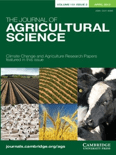
JOURNAL OF AGRICULTURAL SCIENCE
Transforming Agriculture with Cutting-Edge ResearchJOURNAL OF AGRICULTURAL SCIENCE, published by Cambridge University Press, stands as a pivotal resource in the field of agricultural research. With a rich history dating back to 1905, this esteemed journal has consistently delivered cutting-edge scholarly articles that address pressing issues in agronomy, crop science, animal science, and genetics. Currently holding a Q2 ranking in Agronomy and Crop Science and Animal Science and Zoology, and a Q3 in Genetics, it reflects a robust impact within the academic community, contributing to innovative practices and technologies in agriculture. Indexed in Scopus, its authors benefit from broad visibility, supported by a strong readership among researchers, professionals, and students alike. While the journal does not currently offer open access, its rigorous peer-review process ensures that published works meet the highest scholarly standards, fostering a rich environment for knowledge exchange and advancement in agricultural science.
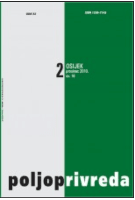
Poljoprivreda
Fostering a community of agricultural excellence and innovation.Poljoprivreda is a distinguished open-access journal dedicated to the field of agronomy and crop science, published by the FAC Agriculture Osijek in Croatia. Since its inception in 2000, the journal has been committed to disseminating high-quality research that informs both academic and practical advancements in agriculture. With an ISSN of 1330-7142 and an E-ISSN of 1848-8080, Poljoprivreda provides a vital platform for researchers, professionals, and students to engage with the latest findings and methodologies in agronomy, contributing significantly to the enhancement of agricultural practices in Croatia and beyond. Although currently ranked in the 22nd percentile within its category according to Scopus, the journal aspires to elevate its standing by welcoming innovative research that addresses contemporary challenges within the agricultural sciences. By fostering open access since 2000, Poljoprivreda ensures that its scholarly content is freely available, promoting wider dissemination and collaborative opportunities among researchers globally.

Revista de la Facultad de Agronomia de la Universidad del Zulia
Innovating Agriculture: Insights from the Heart of VenezuelaWelcome to the Revista de la Facultad de Agronomia de la Universidad del Zulia, a key publication in the fields of Agronomy, Animal Science, Food Science, and Plant Science. Published by the Facultad de Agronomía, Universidad del Zulia, this journal aims to foster academic dialogue and disseminate impactful research that advances knowledge and practice within these disciplines. Operating under the ISSN 0378-7818 and E-ISSN 2477-9407, this journal offers a platform for both emerging and established scholars to share their discoveries and innovations. Despite its challenges, as reflected in its Q4 ranking across multiple categories in 2023, it remains a vital resource for the Venezuelan scientific community and beyond. Readers will benefit from a diverse array of studies and discussions that address contemporary issues in agriculture and related fields, helping inform best practices and policy. Engage with cutting-edge research from Venezuela and contribute to the development of agronomic sciences in the region.

Romanian Agricultural Research
Cultivating Knowledge, Harvesting InnovationsRomanian Agricultural Research is a prominent academic journal dedicated to advancing the field of agricultural science with a specific focus on agronomy and crop management. Published by the NATL AGRICULTURAL RESEARCH & DEVELOPMENT INST in Romania, this journal has established itself as an important resource within its discipline, evidenced by its Q3 ranking in the Agronomy and Crop Science category for 2023. With its ongoing publication since 2008, the journal provides a platform for researchers and professionals to disseminate their findings and share innovative practices that address the challenges faced in agricultural development. Although it operates under a non-open access model, Romanian Agricultural Research commits to rigorous peer-review processes, ensuring the high-quality content that enhances the academic community’s knowledge base. The journal's objective is to foster dialogues surrounding sustainable agriculture, improve crop yield, and contribute to the enhancement of agricultural practices globally. Researchers, professionals, and students will find this journal to be an invaluable repository of knowledge and a catalyst for future agricultural innovations.

TROPICAL AGRICULTURE
Cultivating knowledge for sustainable development in agriculture.Tropical Agriculture is a reputable journal dedicated to advancing knowledge and research in the fields of Agronomy and Development, with a particular emphasis on tropical farming practices and agricultural innovation. Published by the University of the West Indies, this journal serves as a crucial resource for researchers, professionals, and students engaged in the complexities of agriculture in the tropics. Established in 1979, it has witnessed significant contributions and continues to facilitate scholarly discussions through its quarterly publications. While the journal currently holds a Q4 ranking in both the Agronomy and Development categories, its commitment to fostering research excellence positions it as a pivotal platform for emerging studies and regional agricultural advancements. Although not an open-access publication, it provides critical insights and localized research that greatly benefit the agricultural community, particularly within the Caribbean context. Researchers and professionals in the field can rely on this journal for insightful content on tropical agricultural challenges and developments, enhancing knowledge dissemination and application across related disciplines.
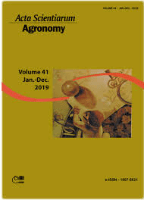
ACTA SCIENTIARUM-AGRONOMY
Innovating agronomy through groundbreaking research.ACTA SCIENTIARUM-AGRONOMY is a prestigious, peer-reviewed journal published by UNIV ESTADUAL MARINGA, PRO-REITORIA PESQUISA POS-GRADUACAO, focusing on advanced research in the field of agronomy and crop science. Since its inception as an Open Access journal in 2007, it has significantly contributed to disseminating high-quality research, allowing unrestricted access to its content for a global audience. Operating from Brazil, the journal holds a notable Q2 category ranking in Agronomy and Crop Science as of 2023, validating its importance within the academic community. The journal’s Scopus ranking positions it in the 49th percentile among Agricultural and Biological Sciences, indicating a robust foundation for impactful research. With a commitment to innovation and scientific excellence, ACTA SCIENTIARUM-AGRONOMY aims to provide researchers, professionals, and students with vital insights that drive forward our understanding of agriculture and its environmental implications.

CROP SCIENCE
Empowering researchers to enhance global food security.CROP SCIENCE, published by WILEY, is a premier journal dedicated to the field of agronomy and crop science, offering a platform for high-quality research on crop production, genetics, and sustainable agricultural practices. With an impactful presence since its inception in 1974, the journal has become a significant contributor to advancing knowledge in this critical field, as evidenced by its Q2 ranking in the 2023 categorizations and a Scopus rank in the 72nd percentile among its peers. The journal's aim is to disseminate innovative research findings that inform best practices and policies for enhancing crop yield and sustainability, making it an essential resource for researchers, professionals, and students alike. Although CROP SCIENCE does not currently offer open access options, the journal’s extensive readership and reputation make it a valuable asset for anyone invested in the future of agriculture.
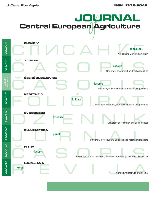
Journal of Central European Agriculture
Pioneering Research for Global Agricultural SolutionsThe Journal of Central European Agriculture, with ISSN 1332-9049 and E-ISSN 1332-9049, is an esteemed platform published by UNIV ZAGREB, FAC AGRICULTURE that caters to the dynamic fields of agronomy, crop science, and animal science. Since its establishment in 2000, this Open Access journal has played a crucial role in disseminating critical research findings while fostering collaboration among academics, researchers, and professionals within the agricultural community. The journal, which is based in the heart of Croatia, spans a rich history of scholarship, with its content available for free to readers and contributors alike. As reflected in its current standings, the journal has achieved a Quartile 3 ranking in Agronomy and Crop Science and Quartile 4 in Animal Science and Zoology for the year 2023, indicating its growing influence within these disciplines. With Scopus ranks placing it in the 32nd percentile among its peers, the Journal of Central European Agriculture is committed to advancing agricultural sciences not only in Central Europe but globally as it prepares for its converged years from 2007 through 2024. This journal serves as a vital resource for innovative research, practical applications, and a deeper understanding of agricultural challenges and solutions.